
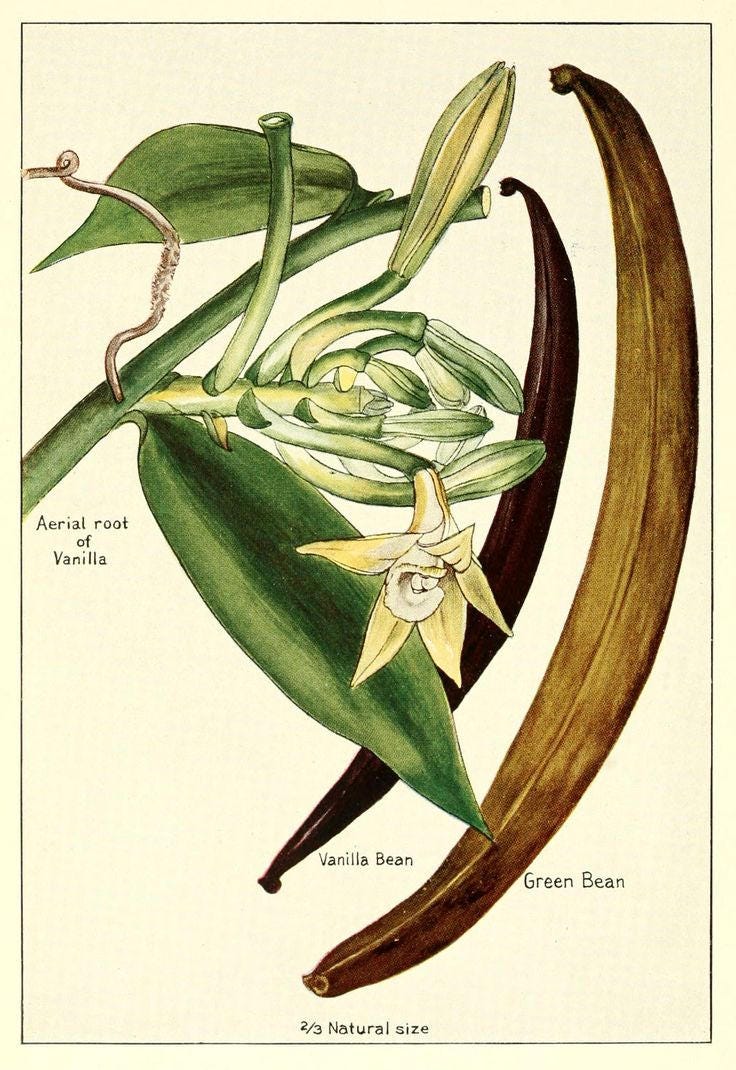
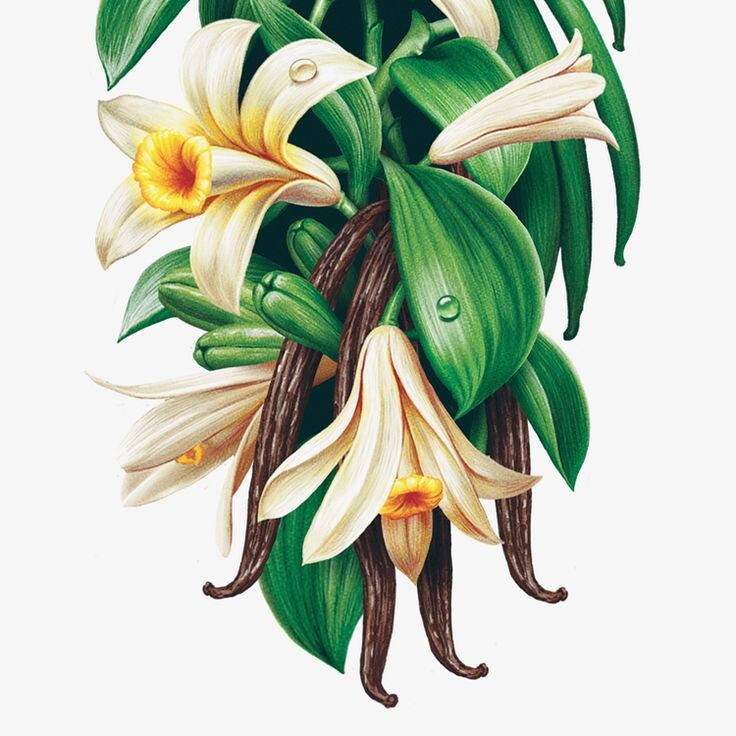
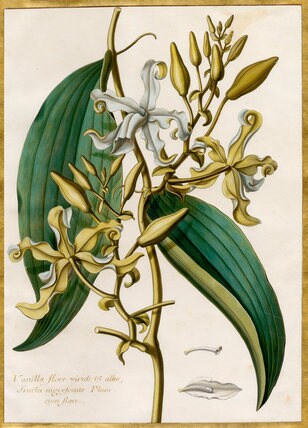
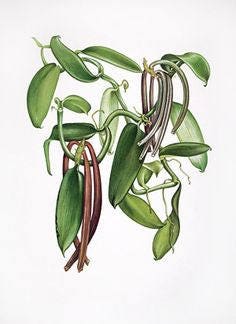
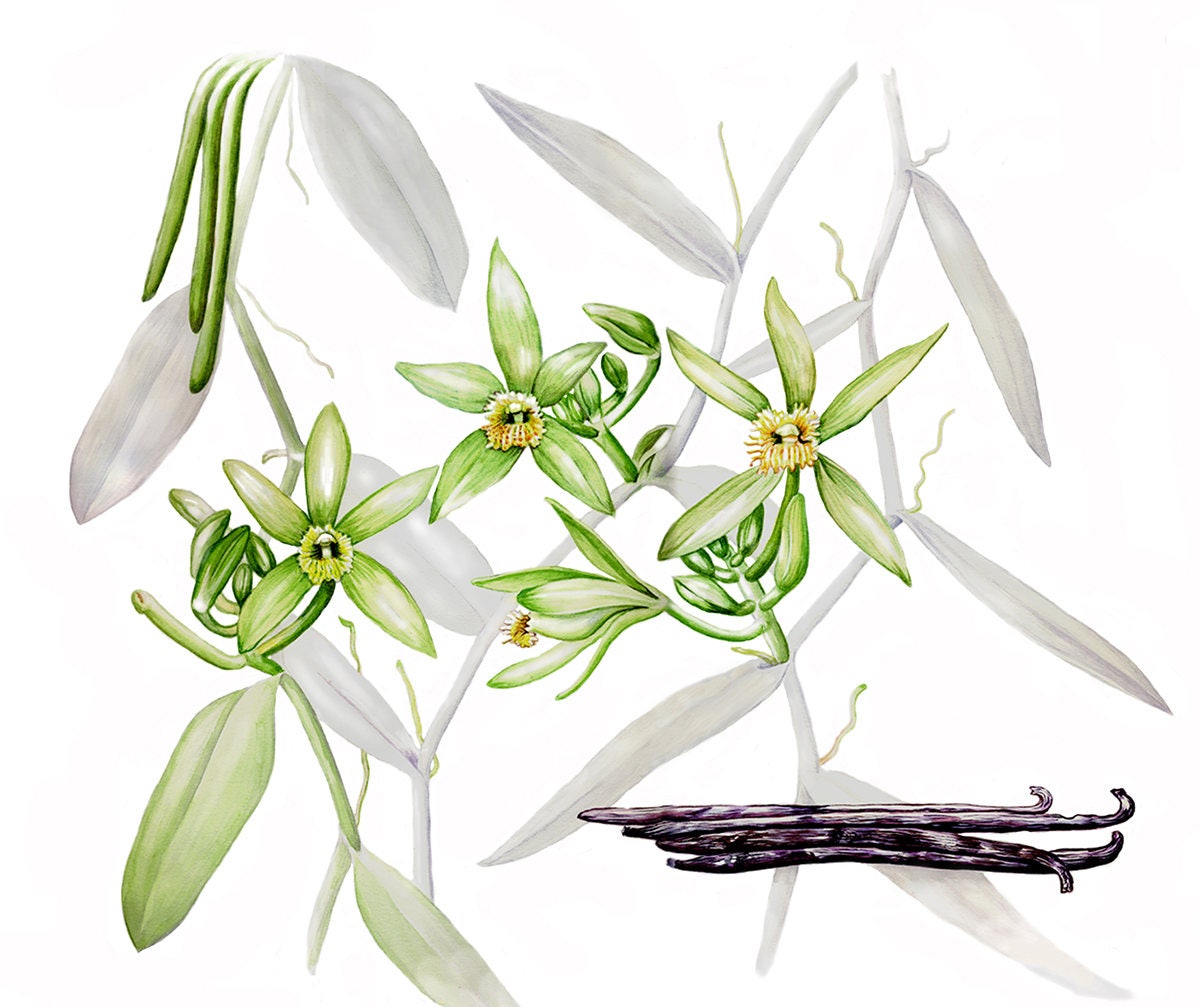
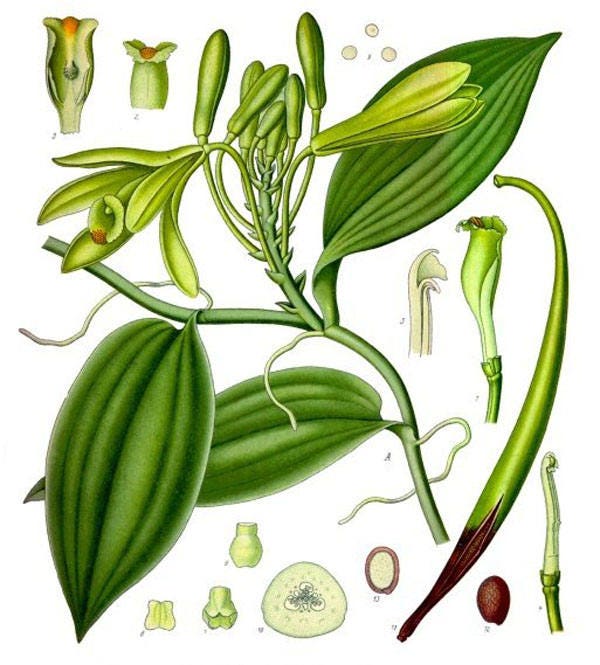
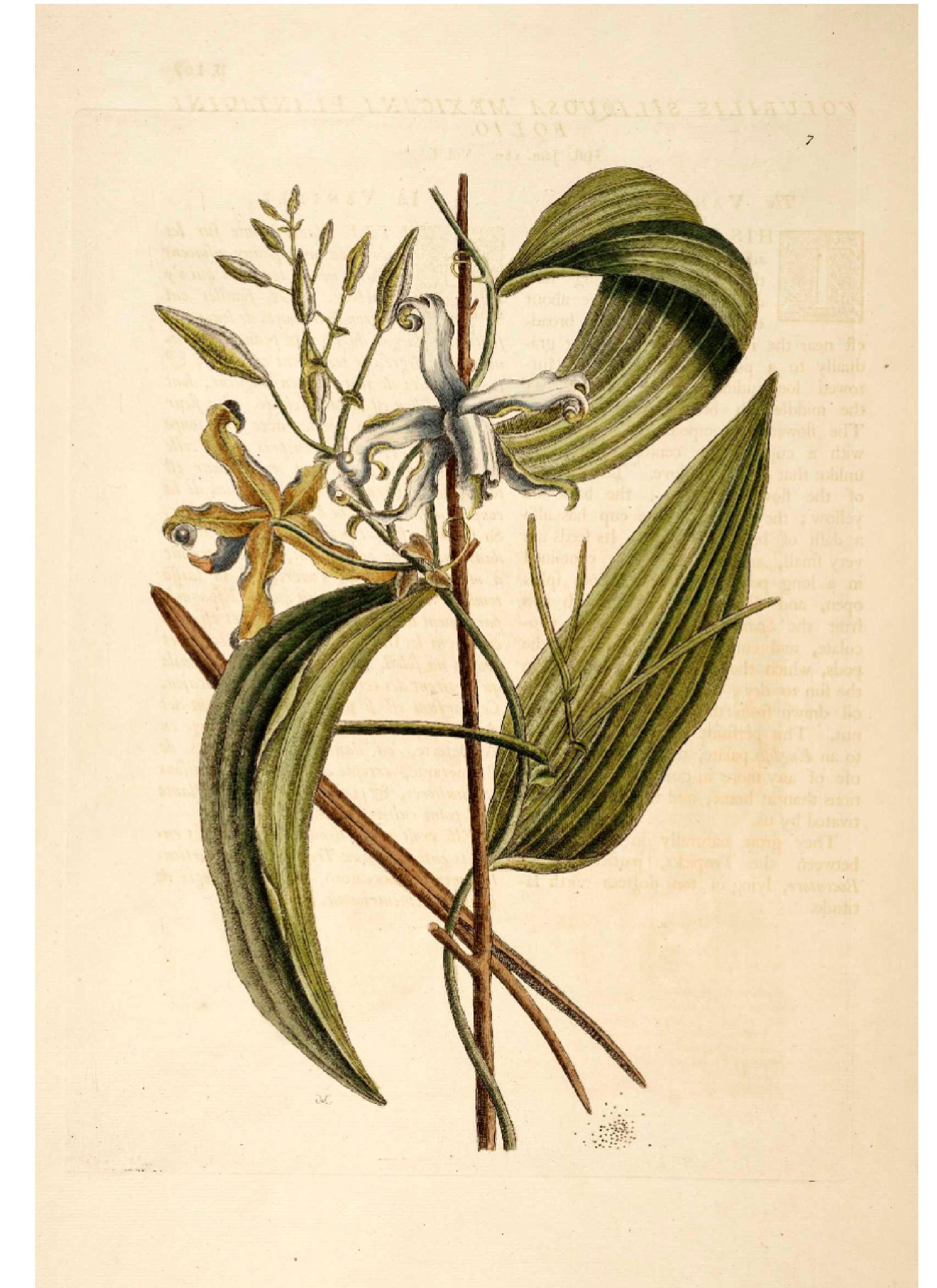
This is just pure 100% Vanilla powder, ground to a medium consistency for convenience. There are no additives like sugar and nor is it a sub standard substitute for vanilla pods - It is high quality premium Madagascan Vanilla.
Vanilla is a flavouring derived from orchids in the genus Vanilla. The name came from the Spanish word "vainilla", meaning "little pod"
It is a native of Mexico, though it is now widely grown throughout the tropics. Madagascar is the world's largest producer. Additional sources include Vanilla pompona and Vanilla tahitiensis (grown in Tahiti).
Vanilla is a vine: it grows by climbing over some existing tree, pole, or other support. It can be grown in a wood (on trees), in a plantation (on trees or poles), or in a "shader", in increasing orders of productivity. Left alone, it will grow as high as possible on the support, with few flowers. Every year, growers fold the higher parts of the plant downwards so that the plant stays at heights accessible by a standing human. This also greatly stimulates flowering.
The part of the plant in which the distinctive flavoured compounds are found is the fruit, resulting from the pollination of the flower. One flower produces one fruit. Vanilla planifolia flowers are hermaphrodite: they carry both male (anther) and female (stigma) organs; however, to avoid self-pollenating (which would tend to result in genetic deficiencies), a membrane separates those organs. Such flowers may only be naturally pollinated by a specifically equipped bee (Meliplona) found in Mexico. Growers have tried to bring this bee into other growing locales, to no avail. The only way to produce fruits in these locales is to, therefore, employ artificial pollination.
A simple and efficient artificial pollination method was introduced in 1841 by a 12 year-old slave named Edmond Albius on Réunion, then a French colony, in the Indian Ocean. This method is still used today. Using a bevelled sliver of bamboo, an agricultural worker folds back the membrane separating the anther and the stigma, then presses the anther on the stigma. The flower is then self-pollinated, and will produce a fruit. The vanilla flower lasts about one day, sometimes less, thus growers have to inspect their plantations every day for open flowers, a labour-intensive task.
The fruit (a seed pod), if left on the plant, will ripen and open at the end; it will then exhaust the distinctive vanilla smell. The fruit contains tiny black seeds, which, in ripe fruits, carry no vanilla flavour. These black seeds are the tiny black specks found in dishes prepared with whole natural vanilla.
Like other orchids, vanilla seed will not germinate without the presence of certain mycorrhizal fungi. Growers reproduce the plant by cutting: they cut sections of the vine with six or more leaf nodes, which have a root opposite each leaf. The lower two leaves are removed and this portion is covered in loose soil at the base of the support tree or post. The remaining upper roots will cling to the support and often will eventually also grow down into the soil. Growth is rapid under good conditions.
Traditional Uses for Vanilla :-
There are three main commercial preparations of natural vanilla : Whole bean.
Vanilla Powder (pure ground beans or lesser quality beans blended with sugar, starch or other ingredients - check with the supplier)
extract (in alcoholic solution)
Vanilla flavour in creams, cakes and other foodstuff may be achieved by adding some vanilla extract or by cooking vanilla beans in the liquid preparation. A stronger aroma may be attained if the beans are split in two; exposing greater surface area of the bean to the liquid. In this case, the innards of the beans (the seeds), consisting of flavourless tiny black grains, are mixed into the preparation. Natural vanilla gives a brownish to yellowish colour to preparations, depending on concentration.
Good quality vanilla has a strong aromatic flavour, but foodstuffs with small amounts of low quality vanilla or artificial vanilla-like flavourings are far more common, since true vanilla is much more expensive.
One major use of vanilla is in flavouring ice cream and thus most people consider it to be the "default" flavour. By analogy, the term "vanilla" is used as a synonym for "plain".
Another use is in the cosmetics industry as an ingredient of perfumes.
In old medicinal literature, vanilla is described as an aphrodisiac and a remedy for fevers, but these purported uses have never been scientifically proven.
Essential oil of vanilla and vanillin were and are sometimes used in aromatherapy.
Methyl vanillin is used by the food industry as well as ethyl vanillin. The ethyl is more expensive but has a stronger note. Cook's Illustrated ran several taste tests pitting vanilla against vanillin in baked goods and other applications, and to the consternation of the magazine editors, all tasters preferred the flavour of vanillin to vanilla.
History of Vanilla:-
Vanilla was a highly regarded flavouring in Pre-Columbian Mesoamerica, and was brought back to Europe (and from there to the rest of the world) by the Spanish Conquistadors.
In ancient Mexico the Totonac people were regarded as the producers of the best vanilla. The Totonac are from the region that is now known as the state of Veracruz (Papantla, Mexico, holds itself out as the origin of vanilla). They continued to be the world's chief producers of the flavouring through the mid 19th century. At that time, French vanilla growers in Mexico traded their knowledge of artificial pollination of flowers for the Totonac knowledge of preparing the beans.
The Coca-Cola Corporation is the world's largest customer of natural vanilla extract. When New Coke was introduced in 1985, the economy of Madagascar crashed, and only recovered after New Coke flopped. The reason was that New Coke used vanillin, a less expensive synthetic substitute, and purchases of vanilla more than halved during this period.
The market price of vanilla rose dramatically high in the late 1970s due to a typhoon. Prices stayed stable at this level through the early 1980s due to the pressure of recently introduced Indonesian vanilla. In the mid 1980s the cartel that had controlled vanilla prices and distribution since its creation in 1930 disbanded. Prices dropped 70% over the next few years to nearly $20 USD per kilo. This changed due to typhoon Huddah, which struck early in the year 2000. The typhoon, political instability, and poor weather in the third year drove vanilla prices to an astonishing $500 USD per kilo in 2004. Its been rising ever since.
Payments
We accept direct payments through Etsy by credit/debit card or Paypal transfers to make it as easy as possible for you.
You have the right to cancel an order within 24 hours of placing the order or by request at any time prior to despatch.
Shipping from United Kingdom
We aim to despatch within 2 working days of receipt of order but will inform you if this differs for some reason for any product you may have ordered. We use a tracking service which requires your parcel to be signed for and you will be able, in many instances, to track the progress of your package from door to door.
Orders to destinations outside the EU will have a customs and excise declaration - customers from outside the UK should make themselves aware of any local restriction on imported plant material and the Natural Herbalist can accept no liability for custom and excise intervention in your order at transit or delivery stage.
PLEASE READ – IMPORTANT
ALL ORDER WILL ONLY BE DESPATCHED USING TRACKED AND SIGNED FOR DELIVERY WHERE APPROPRIATE (some countries provide tracked OR signed for only rather than both)
WE GO TO GREAT LENGTHS TO PROVIDE TRACKING ON YOUR PURCHASE SIMPLY SO THAT YOU CAN, AT ANY POINT ON YOUR PARCEL’S JOURNEY, AND WHERE APPROPRIATE AND APPLICABLE, CHECK ON YOUR PARCEL’S PROGRESS.
TRACKING NOT ONLY INFORMS YOU OF WHERE YOUR PARCEL IS BUT ALSO IF THERE ARE ANY PROBLEMS WITH DELIVERY THAT ONLY YOU CAN CORRECT SUCH AS MISADDRESSED PARCELS, NOT BEING IN WHEN YOU HAVE TO SIGN FOR THE PARCEL OR RE-ARRANGING A DELIVERY TO SUIT YOUR SCHEDULE.
AVOIDING USE OF TRACKING WILL ONLY LEAD IN SOME CIRCUMSTANCES TO YOU LOSING YOUR ORDER WHERE YOUR ASSISTANCE IS REQUIRED BY THE CARRIER TO COMPLETE DELIVERY.
PLEASE USE THE TRACKING SERVICE – IT IS SIMPLE AND EASY TO USE AND WILL HELP YOU AVOID DISAPPOINTMENT
We hope you enjoy your purchase
YOU WILL BE REQUIRED BY YOUR DOMESTIC POSTAL SERVICE TO SIGN FOR YOUR PARCEL UPON ITS DELIVERY – IF YOU ARE NOT AVAILABLE TO SIGN FOR YOUR PARCEL YOUR DOMESTIC CARRIER WILL LEAVE A NOTICE FOR YOU TO CONTACT THEM REGARDING YOUR ARRANGEMENT FOR A MORE SUITABLE TIME FOR DELIVERY OR YOUR COLLECTION OF THE ITEM FROM THE SORTING OFFICE – THEY WILL NORMALLY ALLOW UP TO THREE WEEKS FOR YOU TO ACCOMPLISH THIS.
IF, FOR SOME REASON, YOU DO NOT RE-SCHEDULE A SUITABLE TIME FOR YOUR LOCAL CARRIER TO RE-DELIVER YOUR PARCEL, IT MAY BE RETURNED ULTIMATELY TO US. THIS IS BY NO MEANS CERTAIN AND ALWAYS TAKES LONGER THAN THE OUTWARD JOURNEY BUT ONLY UPON RECEIPT OF THE RETURNED PARCEL WILL A REFUND ON THE PURCHASE PRICE BE MADE. WE WILL NOT SEND THE ITEMS AGAIN NOR REFUND THE ORIGINAL CARRIAGE CHARGE.
Our Shipping Terms and Conditions are shown in detail here...
http://www.luminescents.net/information/shipping/
Our General Terms and Conditions are shown in detail here...
http://www.luminescents.net/information/terms-conditions/
No MSDS or COA certification is provided with your order as per our terms and conditions.
Returns & Exchanges
I gladly accept cancellations
Reviews (2)
Average:
Dec 25, 2017
Good quality product. Was impressed with extremely fast shipping.Thanks for the extra added vanilla too!
Apr 29, 2016
Fantastic addition to my spice cupboard - thank you :)
